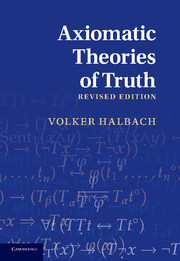Book contents
- Frontmatter
- Contents
- Preface
- Part I Foundations
- 1 Definitional and axiomatic theories of truth
- 2 Objects of truth
- 3 Tarski
- 4 Truth and set theory
- 5 Technical preliminaries
- 6 Comparing axiomatic theories of truth
- Part II Typed truth
- Part III Type-free truth
- Part IV Ways to the truth
- Index of systems
- Bibliography
- Index
3 - Tarski
from Part I - Foundations
Published online by Cambridge University Press: 05 February 2015
- Frontmatter
- Contents
- Preface
- Part I Foundations
- 1 Definitional and axiomatic theories of truth
- 2 Objects of truth
- 3 Tarski
- 4 Truth and set theory
- 5 Technical preliminaries
- 6 Comparing axiomatic theories of truth
- Part II Typed truth
- Part III Type-free truth
- Part IV Ways to the truth
- Index of systems
- Bibliography
- Index
Summary
For a full history of axiomatic theories of truth I would have to go back very far in history. Many topics and ideas found in what follows have been foreshadowed. For instance, even theories structurally very similar to axiomatic compositional theories of truth can be found in Ockham's Summa Logicae, even though Ockham like many other philosophers paid lip service to the correspondence theory of truth.
Relating historical to more recent accounts of truth is often difficult as it is seldom clear whether certain sentences of a particular account should be understood as definitions, descriptions, consequences of a theory, or as axioms.
I think it is safe to claim that the modern discussion of formal axiomatic theories of truth began with Tarski's The Concept of Truth in Formalized Languages (the reader might want to consult Künne (2003) on the development leading up to Tarski). Tarski proved some fundamental results about axiomatic theories although he did not adopt an axiomatic approach. Famously Tarski proposed a definition of truth for certain languages in another more comprehensive language, called the metalanguage. There were, and still are, good motives to aim at a definition rather than a mere axiomatization of truth: if one is wondering whether truth should be considered a legitimate notion at all, a definition might be useful in dispersing doubts about its legitimacy. Tarski wrote his paper when most members of Vienna Circle and the Warsaw School suspected truth to be a concept that should be avoided in good philosophy (see Woleński and Simons 1989 for a historical account).
- Type
- Chapter
- Information
- Axiomatic Theories of Truth , pp. 15 - 24Publisher: Cambridge University PressPrint publication year: 2014

